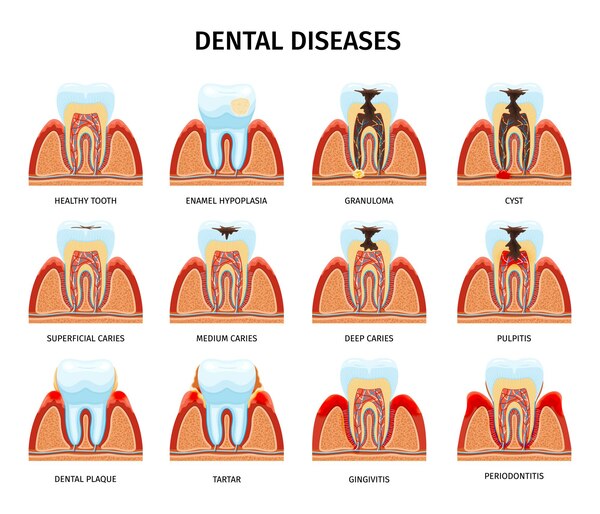
How Long Do Dental Crowns Last
Introduction
When it comes to oral health, dental crowns are like guards; they keep our teeth strong and healthy. These custom-made caps, which can be made from several different materials, are essential for fixing teeth that are broken or damaged in both function and appearance. As we start exploring this blog journey into how long dental crowns last, we will talk about the complex parts that make them up, the things that affect how long they last, and the important care steps that can make them last longer. Come along with us as we try to figure out what dental crowns are and how they work. This will give you the information you need to make smart choices about your oral health. After all, knowing how long these dental miracles last is the key to a beautiful smile that lasts.

Factors Influencing the Lifespan of Dental Crowns
As steadfast protectors of our mouth health, dental crowns are made to last due to a complex mix of different factors. To figure out how long these protection caps will work, it's important to understand these factors. Let us look at the main factors that affect how long dental crown lasts, such as the material they're made of, how well you take care of your teeth every day, the tooth's position and function, and your own habits and lifestyle choices.
Material of the Crown
The material chosen for a dental crown primarily determines its longevity. Different materials offer varying degrees of strength, resilience, and aesthetic appeal. Ceramic crowns provide a natural look but may be more prone to chipping, while metal crowns are renowned for their durability. A deep dive into the characteristics of each material assists individuals in making informed decisions aligned with their unique needs and lifestyles.
Oral Hygiene Practices
The cornerstone of a durable dental crown lies in the daily commitment to oral hygiene. Regular brushing, flossing, and routine dental check-ups are essential to maintaining the crowned tooth's health and its protective cap. Tailoring oral care practices to accommodate the specific needs of a crowned tooth is vital for preventing decay, preserving gum health, and ultimately extending the life of the dental crown.
Tooth Location and Function
The location and function of the tooth to be crowned play a significant role in the wear and tear the dental crown will experience. Molars, tasked with grinding and chewing, may endure more stress than other teeth, impacting the crown's longevity. Understanding the unique demands placed on each tooth informs expectations and aids in developing strategies to safeguard the crown accordingly.
Habits and Lifestyle Factors
Besides the natural causes, habits and living choices the person makes also greatly impact how long dental caps last. Habits like tightening or biting your teeth, which you may not even know, can speed up wear and damage the crown. In the same way, what you eat and how you live your life, like smoking, can affect both the crown and the rest of your mouth. For dental caps to last as long as possible, you must be aware of and change these habits.
Average Lifespan of Dental Crowns
Trying to figure out how long dental crowns usually last is challenging because many things affect how long they last. In this part, we talk about what people typically think about the lifespan. We look at what studies and figures have to say about it and recognize that each case is different.
General Expectations: General assumptions about how long tooth cap will last gives people thinking about getting them or already wearing them a starting point. Most of the time, dentists believe that properly cared for and kept crowns will last between 10 and 15 years. But keep in mind that this is just a rough guess. The actual length will depend on several factors, as each case differs.
Variability Based on Individual Cases: Although general standards can help, it's important to remember that things can be very different depending on the case's specifics. Different people have different mouths, and how well you take care of your teeth, your general health, your habits, and how you live your life can all greatly affect how long your dental crowns last. Some people's crowns may last much longer than average, while others may wear out or have problems with them sooner. Understanding and dealing with these individual factors is important to manage expectations and get the best crown performance.
Signs of Potential Issues
Even though dental crowns are made to last a long time, it's important to keep an eye out for any signs of problems that might appear over time. Keeping an eye on your dental health and noticing early warning signs can help you take care of problems quickly. In this section, we'll talk about some of the most important signs that your dental crown cement might have problems.
Discomfort or Pain: Pain or discomfort is one of the first signs that something is wrong with a dental filling. This could show up as a dull ache, a sharp pain, or sensitivity when you bite down. Discomfort could mean a number of things, such as a crown that doesn't fit right, decay deep inside the tooth, or damage to the tooth structure below the crown. If you're feeling any discomfort, it's important to get professional assistance immediately.

Changes in Appearance: Crowns for teeth are made to match the color and shape of your natural teeth perfectly. Seeing changes in how your capped tooth looks, like darkening, cracks, or damage to the crown itself, could mean that there are problems on the way. If the way your teeth look changes, it could mean that they are wearing down, the crown material is breaking down, or there are deeper problems that need to be fixed.
Sensitivity to Hot or Cold: If you're experiencing more hot or cold, especially when you're eating or drinking, it could mean a problem with sensitivity with your dental crown. This sensitivity could be an early sign of deeper issues, like nerve irritation or a broken seal around the crown. Seeing a dentist as soon as possible can help find and treat the cause of the sensitivity.
Swelling or Inflammation: It's a bad sign if the gums around a crowned tooth swell or become inflamed. It could mean you have an infection, an irritation, or something else that needs to be looked into. Even though many things, like gum disease, can cause inflammation, it's important to consider the possibility of dental crown problems, especially if there are other signs of pain.
To keep dental crowns healthy and long-lasting, it's important to be aware of these signs and get a professional opinion when they appear. Regular dental check-ups and clear communication with your dentist can help you avoid problems before they happen, ensuring that your dental crowns continue protecting your teeth.
Extending the Lifespan of Dental Crowns
Dental crowns are made to last, but self-care is the most important thing you can do to ensure they last as long as possible. This part talks about valuable tips for making your dental cap lasts longer, including good mouth hygiene habits, staying away from behaviors that could damage them, what you eat, and how to protect your crowns while doing physical activities.
Good Oral Hygiene Habits: For a dental crown to last, you need to take great care of your teeth and gums. Plaque buildup can be avoided by brushing your teeth regularly with a soft-bristled toothbrush and toothpaste that doesn't scrape the teeth. This lowers the risk of decay around the capped tooth. Flossing is just as important as brushing because it gets between teeth and along the gumline, places that brushing alone might miss. Keeping up with good oral care habits is crucial for keeping the normal tooth and dental crown healthy.

Avoiding Habits that May Damage Crowns: Some habits can put too much stress on dental crowns, which could weaken them. Avoiding habits like biting hard things, chewing on ice, or using your teeth as tools can help keep the crown from breaking or getting damaged. Also, it would help if you stopped doing things like bruxism (grinding your teeth), which can speed up wear and cause problems with the crown early on.
Dietary Considerations: What you eat has a big effect on your mouth health, and it also affects how long dental caps last. Cutting down on acidic and sugary foods can help lower the risk of decay around the crown. Eating a healthy, well-balanced diet is good for your mouth health as a whole, which includes the health of the capped tooth and the structures around it.
Protective Measures for Physical Activities: Protective steps must be thought through by people who do physical activities or sports. When doing activities where you might get hit or hurt, wearing a mask can protect both your regular teeth and dental crowns. This safety step is especially important for people who play contact sports or have caps on their front teeth.
Doing these things regularly can help your dental caps last longer and work better. Maintaining good mouth hygiene, avoiding habits that could be harmful, making smart food choices, and taking safety precautions while exercising can protect your dental crowns and keep them healthy for years to come. When you talk to your dentist regularly, you can be sure that your preventative efforts are in line with what your mouth health needs.
When to Consider Crown Replacement
Even though dental crowns are made to last, there may come a time when it makes sense to get a new one. In this section, we talk about some of the most important signs that it might be time to get a new dental crowns near me. These include normal wear and tear over time, changes in your oral health, recent developments in dental technology, and concerns about how it looks.
Visible Signs of Wear and Damage:
- If your dental crown shows obvious signs of damage, such as chips or cracks, it may be a sign that the structural stability is weakened.
- Too much wear on the crown's sides could mean it's not covering the tooth underneath as well as it used to.
Discoloration and Aesthetics:
- If the crown gets stained or changes color, it could make your smile look bad. You might want to get a new one if cleaning or skilled bleaching doesn't bring back the color.
- If the crown's color no longer matches your natural teeth, it might be time to look into new choices for a better look.
Gum Health and Sensitivity:
- If you have discomfort or swelling around the gum line that doesn't go away, it could mean your crown isn't fitting right or breaking down. To keep your gums healthy, you may need to get new ones.
- Being more sensitive to hot or cold things could mean problems with the crown's seal, which must be looked at and replaced.
Structural Issues and Decay:
- If rot starts to form under the crown, it could weaken the tooth's structure. Regular oral check-ups can help you find and fix this problem quickly.
- A loose or wobbly crown is a clear sign that it doesn't fit right or that the cement used to connect it isn't strong enough. Getting help right away is important to avoid more problems.
Outdated Materials or Technology:
- If the materials used to make your crown are old and easily damaged, you might want to replace them with newer, more durable ones so that your crown lasts longer.
- Since dentistry technology is always improving, changing an old crown with a newer one may make it last longer and look better.
Regular dental check-ups and consultations with your dentist are crucial for assessing the condition of your dental crown and determining whether replacement is necessary. Addressing potential issues promptly can help maintain your dental work's functionality and aesthetics.
Conclusion
In the dental care journey, understanding the lifespan of dental crowns is a crucial aspect that empowers individuals to actively contribute to the longevity and effectiveness of these protective prosthetics. As we conclude our exploration on this blog, it becomes evident that the durability of dental crowns is influenced by a delicate interplay of factors, including the material of the crown, oral hygiene practices, tooth location and function, habits, lifestyle choices, wear and tear over time, changes in oral health, advances in dental technology, and cosmetic considerations. With this knowledge, individuals can proactively care for their dental crowns, extending their lifespan and optimizing their protective function.
In closing, the lifespan of dental crowns is not just a matter of time but a journey intertwined with individualized care, informed decision-making, and a partnership between individuals and their dental professionals. By staying attuned to the unique needs of your oral health, embracing proactive habits, and seeking timely guidance from dental experts, you can ensure that your dental crowns stand the test of time, providing lasting benefits and contributing to your overall well-being. If you are a dental professional and want to use the best dental products at an affordable price range, visit Dental Finds.

